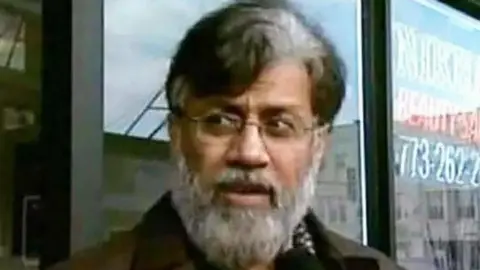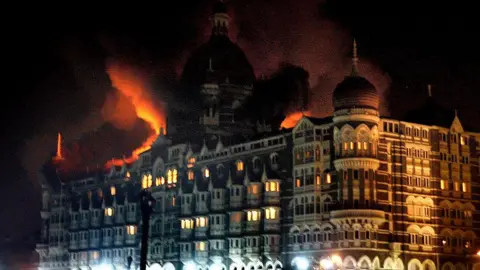Mumbai terror attacks accused extradited by US arrives in India
 ANI
ANIA Pakistan-born Chicago businessman wanted in India for his role in the 2008 terror attacks in Mumbai city has been brought to the country after being extradited from the US.
Tahawwur Rana, a Canadian citizen, landed in Delhi on Thursday. India's National Investigation Agency confirmed his extradition had been successful.
In 2011, a US court cleared him of a direct role in helping plot the attacks that killed 166 people, but convicted him for supporting a militant group blamed for the attacks.
Sentenced to 14 years in prison in 2013, the 64-year-old was released in 2020 on health grounds but was re-arrested later that year after India's extradition request.
A US court approved Rana's extradition in 2023 but he remained in custody pending a final approval by the country's government.
In February, President Donald Trump approved the extradition after his meeting with Prime Minister Narendra Modi.
The US Supreme Court then rejected Rana's appeals against the decision.
The extradition took place under the India-US Extradition Treaty signed by the two countries in 1997.
Who is Tahawwur Rana?
Rana grew up in Pakistan and studied medicine before joining the Pakistani army's medical corps. He and his wife, also a doctor, became Canadian citizens in 2001.
They later moved to Chicago, where Rana ran several businesses, including an immigration and travel agency.
Indian authorities accused Rana of conspiring with his childhood friend David Coleman Headley to assist Pakistani militant group Lashkar-e-Taiba (LeT), which was blamed for the Mumbai attacks.
A group of 10 militants stormed a train station, hotels, cafes and a Jewish centre in Mumbai, shooting and throwing bombs. Both India and the US designated LeT as a terrorist organisation.
US prosecutors in the case said that in 2006, Rana allowed Headley to open an office of his Chicago-based immigration services firm in Mumbai, which Headley then used as cover to scout sites for the 2008 attacks.
Rana was also accused of allowing Headley to pose as a representative of his firm in order to gain access to newspaper offices by feigning interest in purchasing advertising space.
Headley - who pleaded guilty to identifying locations for the Mumbai attacks - was a key prosecution witness. He said he had links to LeT and to the Pakistani intelligence service ISI. Pakistan has repeatedly denied any such links. Headley also testified against Rana.
Rana's defence team at the time said he was manipulated and misled by Headley, an old friend from their days in a Pakistani military school.
In 2011, jurors at the federal court in Chicago convicted Rana for providing support to LeT and for his role in an aborted plot against a Danish newspaper Jyllands Posten. But he was cleared of the more serious charge of helping plot the Mumbai attacks and received a 14-year jail term.
Headley was given a 35-year sentence for his role in the attacks. He is lodged in a federal prison in Chicago.
 Getty Images
Getty ImagesWhat are the charges against Rana in India?
In India, Rana and Headley were tried in absentia in a Mumbai court for their alleged involvement in the attacks. Headley later turned approver in the case.
The charges brought against Rana by India's National Investigation Agency include criminal conspiracy, waging war against the Indian government and terrorism.
In his plea against being extradited to India in the lower court in the US, Rana had argued that India intended to prosecute him for the same offences for which he had been acquitted by the US court.
His plea was rejected, with the court saying the Indian charges were distinct from those he had been prosecuted for in the US.
In his appeal in the US Supreme Court to stay his extradition, Rana said it would violate US law and the United Nations Convention Against Torture "because there are substantial grounds for believing that, if extradited to India, petitioner will be in danger of being subjected to torture".
"The likelihood of torture in this case is even higher though as petitioner faces acute risk as a Muslim of Pakistani origin charged in the Mumbai attacks," the application said.
It also cited Rana's underlying health conditions and concerns about the treatment he would receive in Indian prison. His plea was rejected.
Ujjwal Nikam, the former public prosecutor in the case in Mumbai, told ANI news agency that Rana's extradition would help reveal more about "the involvement of Pakistan's security apparatus" in the attacks.
